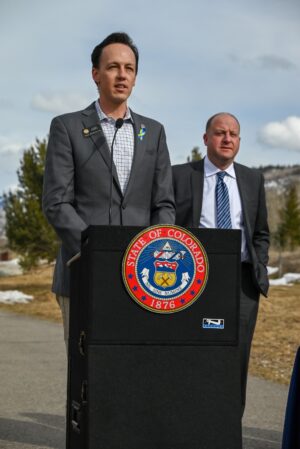Widgetized Section
Go to Admin » Appearance » Widgets » and move Gabfire Widget: Social into that MastheadOverlay zone
Polis signs Roberts, Donovan housing, workforce support bill into law in Edwards
The office of state Rep. Dylan Roberts, D-Avon, on Friday issued the following press release on the local signing into law of a bipartisan housing and workforce support bill aimed at easing acute labor and housing shortages across the state:
EDWARDS, CO — On Thursday, Governor Jared Polis traveled to the Western Slope and signed into law HB22-1117, a bill sponsored by Representative Dylan Roberts to allow local communities to fund housing, workforce development, and other community needs. The new law, co-sponsored by Rep. Dylan Roberts (D-Avon), Rep. Marc Catlin (R-Montrose), Sen. Kerry Donovan (D-Vail), and Sen. Don Coram (R-Montrose), changes state statute to give local counties and marketing districts the ability to use their lodging tax revenue, with voter permission, for important community needs related to tourism like housing, child care, and infrastructure improvements to enhance the visitor and the overall community-wide experience.

“This is one of the most consequential pieces of legislation for affordable workforce housing in the mountains in a very long time. Mountain communities have long asked for this tool — the ability to use the revenue brought in by tourists to support the workers and communities that serve those tourists — but have been prevented from doing so by state law”, said Rep. Dylan Roberts. “With the Governor’s signature, we have changed that law to allow local communities from Eagle County to Moffat County, Routt County to Grand County, and all across the state, to decide for themselves how to utilize lodging tax dollars. As we grapple with a workforce housing crisis and a rising cost of living in our mountain communities, it just makes sense to let locals decide how to use the revenue brought in by tourists and to ensure we are supporting the workforce that serves their region’s visitors.”
“At the heart of every mountain town are its locals,” said Senator Kerry Donovan. “This law will let counties reinvest dollars back into supporting the people that call these communities home.”
As communities across the state grapple with the acute needs facing the tourism and local workforce, finding a dedicated and sustainable source of funding for housing, child care, and other crucial community essentials is vitally needed. Lodging taxes, capped by state law at 2%, are currently only allowed to be used for marketing and tourism promotion. Yet, as more visitors than ever before come to our state and to our mountain communities, the workforce needed to serve those visitors are struggling to find affordable housing. County commissioners and community leaders of both parties, and of many industries called on the legislature to make this change in state statute. Now law, HB22-1117 will give counties and local marketing districts the ability to ask voters to impose a lodging tax if they do not have one already or change an existing lodging tax, and direct the revenue to community needs like housing. Per the bill, at least 10% of the revenue will remain dedicated to tourism marketing and promotion.
“The lack of housing for employees in Colorado’s rural, mountain, and resort communities has reached a crisis level and it is directly impacting the provision of basic services as well as the ability to adequately staff and operate businesses,” said Margaret Bowes, Executive Director of Colorado Association of Ski Towns (CAST). “CAST and its members strongly support HB22-1117 as it would allow local governments and their voters to determine how lodging tax dollars can best address local needs, whether that be workforce housing, child care, or other community and visitor needs.”
With the Governor’s signature, HB22-1117 takes effect on August 10, 2022. Starting as soon as this year, County Commissioners and Local Marketing Districts could propose questions on the general election ballot to ask voters to impose a 2% lodging tax on hotel stays and use the revenue for uses prescribed by the new law including affordable workforce housing, child care, infrastructure improvement or more. At least 10% of the revenue generated must go to the funding of tourism promotion and marketing. If a county or local marketing district already has a lodging tax, they must ask their voters for approval to change the use of the tax.


